|
|
|
Sort Order |
|
|
|
Items / Page
|
|
|
|
|
|
|
| Srl | Item |
| 1 |
ID:
060186
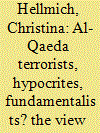

|
|
|
| 2 |
ID:
123033
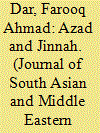

|
|
|
| 3 |
ID:
006253
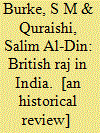

|
|
|
|
|
| Publication |
Oxford, Oxford University Press, 1995.
|
| Description |
xiv, 699p.hbk
|
| Standard Number |
0195775694
|
|
|
|
|
|
|
|
|
|
|
|
Copies: C:1/I:0,R:0,Q:0
Circulation
| Accession# | Call# | Current Location | Status | Policy | Location |
| 037502 | 954.03/BUR 037502 | Main | On Shelf | General | |
|
|
|
|
| 4 |
ID:
049859
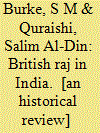

|
|
|
|
|
| Publication |
Oxford, Oxford University Press, 1995.
|
| Description |
xiv, 699p.hbk
|
| Standard Number |
0195775694
|
|
|
|
|
|
|
|
|
|
|
|
Copies: C:1/I:0,R:0,Q:0
Circulation
| Accession# | Call# | Current Location | Status | Policy | Location |
| 042512 | 954.03/BUR 042512 | Main | On Shelf | General | |
|
|
|
|
| 5 |
ID:
129147
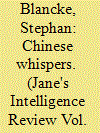

|
|
|
| 6 |
ID:
129500
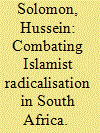

|
|
|
|
|
| Publication |
2014.
|
| Summary/Abstract |
Is radical Islamism spreading in South Africa? The answer has to be an emphatic 'yes'. When discussing issues of radicalisation in Africa, commentators often examine the case of Somalia's al-Shabaab or al-Qaeda's North African franchise, al-Qaeda in the Islamic Maghreb (AQIM). Very little attention is paid to radicalisation amongst South Africa's Muslim population. Yet, there is growing evidence that South Africa has come to play an important role in global jihadi networks, from the provision of safehouses and identity documents to the movement of funds and the existence of paramilitary camps for local and foreign jihadis. This paper aims to briefly examine radicalisation and its attendant sources in the country, as well as seeking ways to combat it utilising lessons learned from other countries. 'Institutional socialisation' by means of the sources of radicalisation, as well as the concept of what could be termed 'the democratisation of jihad' are discussed. The author also proposes ways to combat radicalisation in South Africa utilising lessons learned from other countries, concluding that issues of radicalisation and deradicalisation have to be dealt with on the part of both government and the South African Muslim community.
|
|
|
|
|
|
|
|
|
|
|
|
|
|
|
|
| 7 |
ID:
131477
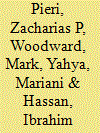

|
|
|
|
|
| Publication |
2014.
|
| Summary/Abstract |
This paper examines the concept of (public) sin as well as efforts to counteract sin from the perspective of Islam. The understanding that hisba, the prohibition of vice and enjoining of virtues, are a responsibility of both the state and the community is common in historical and contemporary Muslim societies. Where the state cannot or does not provide means for countering (public) sin, the perception for some Muslims is that the responsibility on the community and individuals to do so increases. Based on ethnographic research in Britain, Nigeria, Indonesia, Malaysia, and Singapore, the paper highlights examples of how sin has been defined amongst Muslim communities as well as the methods and rationales given to justify the forbidding of sin as a collective and communal public obligation. As the world becomes more integrated, there is growing concern amongst Muslim communities that sin is becoming the norm, leading society to degeneracy, that people who would not have otherwise sinned are influenced to do so. Common features in forbidding sin across Muslim communities have appeared, often focusing on what are seen as moral issues such as dress codes, music, gambling, alcohol, smoking, and the mixing of men and women in public. The forbidding of sin has resulted in attempts to introduce "Shari'a Zones" in some predominantly Muslim areas of London, whilst in Indonesia, this has given rise to the Islamic Defenders Front and in some Northern Nigerian states to the reintroduction of the criminal codes of the Shari'a.
|
|
|
|
|
|
|
|
|
|
|
|
|
|
|
|
| 8 |
ID:
128675
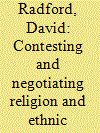

|
|
|
|
|
| Publication |
2014.
|
| Summary/Abstract |
Post-Soviet Central Asia has inherited a set of circumstances conducive to the revitalization of religion. The renewal of Muslim awareness and identity in Central Asia may not be surprising, but the growth of Christianity is, especially in its Protestant form within indigenous Muslim communities. This article, based on qualitative field research, reviews one example of this development: the process of conversion to Protestant Christianity among Muslim Kyrgyz in Kyrgyzstan. A prominent aspect of this social movement has been the ways in which Kyrgyz Christians have entered into a dynamic process of engaging with issues of identity and what it means to be Kyrgyz - a process that has sought to locate their new Christian religious identity within, rather than on the margins of, familial and ethnic identity, and one that challenges the normative understanding of Kyrgyz identity: that to be Kyrgyz is to be Muslim. While providing the context for Kyrgyz conversion, this discussion primarily focuses on the way Kyrgyz Christians utilize a number of different discursive strategies to contest normative Kyrgyz identity constructs and to legitimize a Kyrgyz Christian identity.
|
|
|
|
|
|
|
|
|
|
|
|
|
|
|
|
| 9 |
ID:
090948
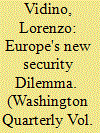

|
|
|
|
|
| Publication |
2009.
|
| Summary/Abstract |
After the September 11, 2001, attacks, governments throughout the world rushed to improve their counterterrorism policies. Several countries tightened legislation, increased resources available to their intelligence and law enforcement agencies, and established repressive policies to uncover and prosecute terrorist networks. Policymakers, fearing an imminent attack, understandably focused their attention on aggressive methods. Yet, over the last few years, many governments have started thinking about more nuanced, comprehensive, and long-term counterterrorism policies, understanding that simply trying to dismantle terrorist networks is like playing a never-ending game of "whack-a-mole," unless steps are also taken to prevent the radicalization of scores of potential new militants.
|
|
|
|
|
|
|
|
|
|
|
|
|
|
|
|
| 10 |
ID:
095481
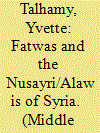

|
|
|
|
|
| Publication |
2010.
|
| Summary/Abstract |
There were five fatwas prior to the twentieth century which were issued by Sunni scholars. Some of these fatwas were specifically against the Nusayris/Alawis while others were against all the extreme Shi'ite creeds including the Nusayris. The first three fatwas were issued during the fourteenth century, during the period of Mamluk rule. They were issued by Shaykh al-Islam Taqi al-Din ibn Taymiyya, and were specifically directed against the Nusayris. The fourth fatwa was issued during the first years of the Ottoman rule over the region of Syria and was against all the extreme Shi'ite creeds. The fifth and last fatwa was issued by a local Shaykh of Latakia specifically against the Nusayris. Those fatwas viewed the Nusayris as heretics outside Islam. During the twentieth century, after the collapse of the Ottoman Empire, the region witnessed the ascendance of 'Pan Arabism', and it was during this period that the Nusayris, known now as Alawis, received a fatwa from the prominent Sunni mufti Hajj Amin al-Husayni recognizing them as part of the Muslim community, which helped them integrate into the Arab world and in Syria. In 1970, the Alawis, under the leadership of the Alawi Hafiz al-Asad, became the rulers of Syria. During the 1970s the Alawis were granted two additional fatwas, this time from prominent Shi'ite scholars recognizing them as part of the Shi'ite creed. All these fatwas had an enormous effect on shaping the history of the Nusayris.
|
|
|
|
|
|
|
|
|
|
|
|
|
|
|
|
| 11 |
ID:
122429
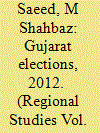

|
|
|
| 12 |
ID:
118767


|
|
|
| 13 |
ID:
166904
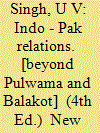

|
|
|
|
|
| Edition |
4th Ed.
|
| Publication |
New Delhi, Pentagon Press, 2019.
|
| Description |
lxi, 306p.hbk
|
| Standard Number |
9789386618825
|
|
|
|
|
|
|
|
|
|
|
|
Copies: C:1/I:0,R:0,Q:0
Circulation
| Accession# | Call# | Current Location | Status | Policy | Location |
| 059688 | 327.5405491/SIN 059688 | Main | On Shelf | General | |
|
|
|
|
| 14 |
ID:
112611
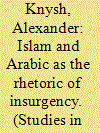

|
|
|
|
|
| Publication |
2012.
|
| Summary/Abstract |
Interpretations and uses of Islam are legion today. Some call for improving or preserving the morals and dignity of a certain local Muslim community or of the global Muslim community (umma) in its entirety. Others are eager to demonstrate that Islam is fully compatible and, in fact, conducive to modernity, democratic governance, and technological advancement of humankind. Still others posit Islam as a powerful means of liberation from occupation and domination/exploitation of Muslims around the world by non-Muslim powers. 1
This article addresses one concrete example of how some Muslim insurgents of the Northern Caucasus use Islam to unite the diverse and occasionally mutually hostile ethnic groups of the area in the face of Russian domination with the goal of establishing an independent Islamic state based on the Muslim Divine Law (Sharia). After providing a general overview of the history and ideology of this Islamic/Islamist movement, the article focuses on the ways in which its leadership uses the Internet to disseminate its understanding of Islam and to rally young Muslims round the idea of the trans-ethnic Sharia state that they promise to institute after defeating and expelling "the Russian occupiers" and their local backers. Special attention will be given to the role of Islamic concepts and taxonomies as well as the Arabic language in framing the political grammar of the insurgency movement known as "The Caucasus Emirate.
|
|
|
|
|
|
|
|
|
|
|
|
|
|
|
|
| 15 |
ID:
118917
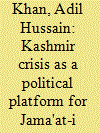

|
|
|
|
|
| Publication |
2012.
|
| Summary/Abstract |
This paper looks at Jama'at-i Ahmadiyya's political involvement in the Kashmir crisis of the 1930s under its second and most influential khalifat al-masih, Mirza Bashir al-Din Mahmud Ahmad, who took over the movement in 1914, six years after the death of his father, Mirza Ghulam Ahmad. Communal tensions springing from the Kashmir riots of 1931 provided Mirza Mahmud Ahmad with an opportunity to display the ability of his Jama'at to manage an international crisis and to lead the Muslim mainstream towards independence from Britain. Mahmud Ahmad's relations with influential Muslim community leaders, such as Iqbal, Fazl-i Husain, Zafrulla Khan, and Sheikh Abdullah (Sher-i Kashmir), enabled him to further both his religious and political objectives in the subcontinent. This paper examines Jama'at-i Ahmadiyya's role in establishing a major political lobby, the All-India Kashmir Committee. It also shows how the political involvement of Jama'at-i Ahmadiyya in Kashmir during the 1930s left Ahmadis susceptible to criticism from opposition groups, like the Majlis-i Ahrar, amongst others, in later years. Ultimately, this paper will demonstrate how Mahmud Ahmad's skilful use of religion, publicity, and political activism during the Kashmir crisis instantly legitimized a political platform for Jama'at-i Ahmadiyya's entrance into the mainstream political framework of modern South Asia, which thereby has facilitated the development of the Ahmadi controversy since India's partition.
|
|
|
|
|
|
|
|
|
|
|
|
|
|
|
|
| 16 |
ID:
094011
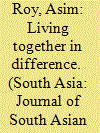

|
|
|
|
|
| Publication |
2010.
|
| Summary/Abstract |
If history is commonly viewed as a useful tool for seeking linkage between the past and present, the politics of colonial and post-colonial India has indeed come to place pre-colonial India at the centre of historical debates in contemporary India. Despite the relative dominance of the secular liberal nationalists in the colonial and the early decades of post-colonial India, the subsequent period saw the steady emergence and rise of the 'extremist' or 'militant' Hindu supremacist ideology of Hindutva-vad, the totalising, homogenising and unhistorical political-cultural construct of the notion of Hindutva (literally, the 'essence' of Hinduism or 'Hindu-ness'). The Hindutva-vadi (literally, the propagation of Hindutva-vad) has come to represent, in practical terms, an intolerant and violent Hindu majoritarian politics. In the name of redressing the alleged 'past wrongs and injustices' perpetrated on the contemporaneous Hindus by their 'medieval' Muslim conquerors, the Hindutva-vadi particularly target the minority Muslim community. The litany of those 'medieval' Muslim 'sins', in the eyes of today's Hindutva-vadi is long, and ranged from alleged discriminatory attitudes and measures, forced conversions, temple desecrations and destructions, construction of mosques at times on those ruined temples, to outright executions and slaughters.
|
|
|
|
|
|
|
|
|
|
|
|
|
|
|
|
| 17 |
ID:
083718
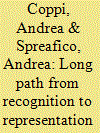

|
|
|
|
|
| Publication |
2008.
|
| Summary/Abstract |
The Muslim community in Italy does not benefit from official recognition, which could, among other things, provide it with access to state funding. Nor does its fragmented nature favour a process of aggregation leading to the formation of a single representative body delegated to dialogue with the institutions. The government initiative establishing the Council of Italian Islam (Consulta) sought to encourage an original course in this direction, but it seems that the body is unlikely to solve the problem. The solutions adopted in various European countries and the proposals put forward by experts suggest that legal recognition cannot sidestep the question of representation and therefore calls for a process of cultural mediation.
|
|
|
|
|
|
|
|
|
|
|
|
|
|
|
|
| 18 |
ID:
094169
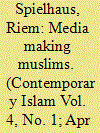

|
|
|
| 19 |
ID:
134139
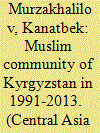

|
|
|
|
|
| Publication |
2014.
|
| Summary/Abstract |
The author analyzes the current state of affairs in the Muslim community of Kyrgyzstan and its relations with the state.
Emerging and developing amid never-ending conflict, the community has inevitably become relatively radicalized (the faithful are divided into jamaats) and, at times, destructive.
The author offers his own cures for the old and new problems of relations between the state and the Muslim community, the resolution of which is absolutely indispensable for their future development.
|
|
|
|
|
|
|
|
|
|
|
|
|
|
|
|
| 20 |
ID:
108397
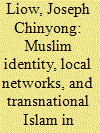

|
|
|
|
|
| Publication |
2011.
|
| Summary/Abstract |
This paper discusses the nature of local permutations of transnational Muslim networks in Thailand's southern Muslim-majority provinces and assesses their impact on creed, custom, and conflict in the region. More specifically, the paper interrogates the agenda and methods of idea and norm-propagation on the part of these agents and networks, and their evolving role, as well as the structures and conduits through which they operate and mobilize. In so doing, it finds a tremendously fluid and dynamic terrain in southern Thailand, where narratives, representations, and expressions of Islamic doctrine, legitimacy, and authority, are increasingly heavily contested within the Muslim community as a whole. In addition, the paper investigates the transnational dimensions of on-going violence in the southern provinces. Here, it argues that there is little by way of substantive evidence of any sustained penetration of the conflict in southern Thailand by external actors. No doubt, many have attempted to draw conclusions to the contrary, but their evidence and arguments, not to mention analytical methodology, are tenuous at best.
|
|
|
|
|
|
|
|
|
|
|
|
|
|
|
|
|
|
|
|
|